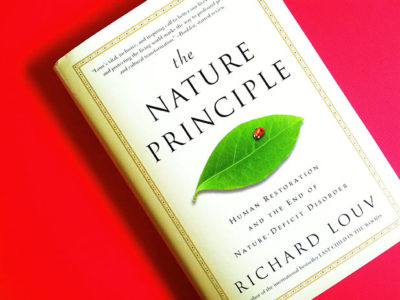What if we considered nature contact essential to our health and well-being…
What would our lives be like? What would our homes, our cities, our businesses be like? What would we be like?
These are a few of the questions Richard Louv addresses in The Nature Principle.
In his earlier book, Last Child in the Woods, he introduced the term nature-deficit disorder. His non-medical diagnosis for the malady that afflicts children in our increasingly tech-reliant, nature-disconnected world.
“Nature-deficit disorder describes the human costs of alienation from nature, among them: diminished use of the senses, attention difficulties, and higher rates of physical and emotional illnesses.”
In the Nature Principle, Louv acknowledges that adults suffer from nature-deficit disorder, too. And he offers a prescription for healing.
The medication is a complete re-ordering our lives and our culture, to start living as though nature matters.
“This principle holds that a reconnection to the natural world is fundamental to human health, well-being, spirit, and survival.”
Using scientific research, anecdotes, and personal stories, Louv details the many ways we benefit from the natural world. And then he shows us the way forward to his idea of a restored humanity.
We learn that spending time in nature enhances our intelligence and creativity, builds our physical and emotional fitness, and strengthens our bonds with family and community. We discover ways to design our homes, businesses, and cities to facilitate nature awareness. Ideas include installing ceiling panels that replicate natural light, restoring native plants in backyard gardens, and creating family nature clubs. And in the end, we are treated to an inspiring vision for life in this new nature-connected society.
I loved the call to action at the end. The author calls for a New Nature Movement, a radical shift in what we now consider normal behavior. To start this movement, we don’t have to lobby for changes in government policy, fight for a new corporate culture, or even trash our technology. We just have to change ourselves and connect with others who are doing the same.
And when we put nature in its rightful place, at the center of our lives, we’ll be better off for it.
“…in an age of rapid environmental, economic, and social transformation, the future will belong to the nature-smart–those individuals, families, businesses, and political leaders who develop a deeper understanding of nature, and who balance the virtual with the real.”
A few more notable quotes:
“As a species, we are most animated when our days and nights on Earth are touched by the natural world.”
“Humans living in landscapes that lack trees or other natural features undergo patterns of social, psychological, and physical breakdown that are strikingly similar to those observed in animals that have been deprived of their natural habitat.”
“We exist in a matrix of electronic currents and beeping cell phones. What if we were equally aware of the swirling currents of, say, monarch butterflies, whose progeny each year migrate over a thousand miles to spend the winter in a small patch of Mexico?”
“We’ll see a demand for quieter technology and living soundscapes only when a sufficient number of us want to be outdoors.”
“Generous future historians may someday write that our generation finally met the environmental challenges of our time—not only climate change, but the change of climate in the human heart, our society’s nature-deficit disorder—and, because of these challenges, we purposefully entered one of the most creative periods in human history; that we did more than survive or sustain, that we laid the foundation for a new civilization, and that nature came to our workplaces, our neighborhoods, our homes, and our families.”
Quotes from Richard Louv, The Nature Principle: Reconnecting with Life in a Virtual Age

 Beginner’s Green Smoothie
Beginner’s Green Smoothie